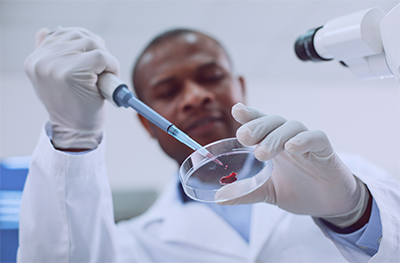Circulating oxysterol levels
In an article in the journal Clinical Chemistry and Laboratory Medicine, F. Peter Guengerich of the Vanderbilt School of Medicine and an international team showed a correlation between certain circulating molecules and the presence of cancerous cells.
 Finding cancer before it has progressed or spread is crucial when trying to fight the disease. Despite this, early cancer detection remains a challenge. Cancers often can lie undetected without symptoms until it’s too late for effective treatment. Recent research, however, may present a new path to overcoming this obstacle.
Finding cancer before it has progressed or spread is crucial when trying to fight the disease. Despite this, early cancer detection remains a challenge. Cancers often can lie undetected without symptoms until it’s too late for effective treatment. Recent research, however, may present a new path to overcoming this obstacle.
Oxygenated metabolites of cholesterol, called oxysterols, are molecules formed naturally through metabolic processes and play important roles in mediating cholesterol and lipid metabolism. By measuring the blood levels of oxysterols in breast cancer patients before and after tumor removal, Guengerich and colleagues discovered that certain concentrations changed, indicating a potential role for them in cancer biology.
“In general, some people think that most cancer is caused by things in the environment, like smoking or the things they eat,” Guengerich said. “Turns out there’s a lot of stuff going on in our own bodies, like metabolism, that’s driving cancer.”
Oxysterols have been implicated in breast cancer in the past, but this new research indicates that their role may be more complex than previously thought. While researchers have known for years that there are multiple types of oxysterols, it turns out that these oxysterols can behave very differently from each other when tumors grow and are removed.
Particularly surprising to Guengerich and his team was that one oxysterol, 7-ketocholesterol, or 7-keto, actually decreased in concentration when tumors grew and increased in concentration after tumors were removed. Previously, many scientists believed that more cancer would mean more oxysterols.
“Even in this field, people have the idea that all oxysterols are bad, but our work indicates that that may not be true,” said Guengerich, who is a deputy editor of the Journal of Biological Chemistry. “Levels of individual oxysterols are going up and down in relation to a cancer, so they’re not necessarily all good or all bad, but all have their own type of biology.”
This richer picture of oxysterol behavior gives rise to the hope that the monitoring of oxysterols could become an early warning system for cancer, although Guengerich warns that we’re not there yet. Studies are needed to determine how oxysterol levels change after tumor removal and how those changes correlate with survival rates. Researchers also want to determine if changes in oxysterols indicate cancer metastasis.
This research project was limited; only 24 patients were involved and the study lacked healthy control subjects for comparison. “Cancer is a heterogeneous type of disease, and we need more people and time to be clinically useful,” Guengerich said.
Oxysterols such as 7-keto may not yet be useful biomarkers, but they present a promising avenue of research and raise new questions: What causes the change in oxysterol levels? Are these changes a cause of breast cancer or a side effect? When answers are found, they could lead to new tools in the fight against breast cancer.
Enjoy reading ASBMB Today?
Become a member to receive the print edition four times a year and the digital edition monthly.
Learn moreGet the latest from ASBMB Today
Enter your email address, and we’ll send you a weekly email with recent articles, interviews and more.
Latest in Science
Science highlights or most popular articles

ASBMB announces 2026 JBC/Tabor awardees
The seven awardees are first authors of outstanding papers published in 2025 in the Journal of Biological Chemistry.

Missing lipid shrinks heart and lowers exercise capacity
Researchers uncovered the essential role of PLAAT1 in maintaining heart cardiolipin, mitochondrial function and energy metabolism, linking this enzyme to exercise capacity and potential cardiovascular disease pathways.

Decoding how bacteria flip host’s molecular switches
Kim Orth will receive the Earl and Thressa Stadtman Distinguished Scientists Award at the ASBMB Annual Meeting, March 7–10, just outside of Washington, D.C.

Defining JNKs: Targets for drug discovery
Roger Davis will receive the Bert and Natalie Vallee Award in Biomedical Science at the ASBMB Annual Meeting, March 7–10, just outside of Washington, D.C.

Building better tools to decipher the lipidome
Chemical engineer–turned–biophysicist Matthew Mitsche uses curiosity, coding and creativity to tackle lipid biology, uncovering PNPLA3’s role in fatty liver disease and advancing mass spectrometry tools for studying complex lipid systems.

Redefining lipid biology from droplets to ferroptosis
James Olzmann will receive the ASBMB Avanti Award in Lipids at the ASBMB Annual Meeting, March 7–10, just outside of Washington, D.C.

